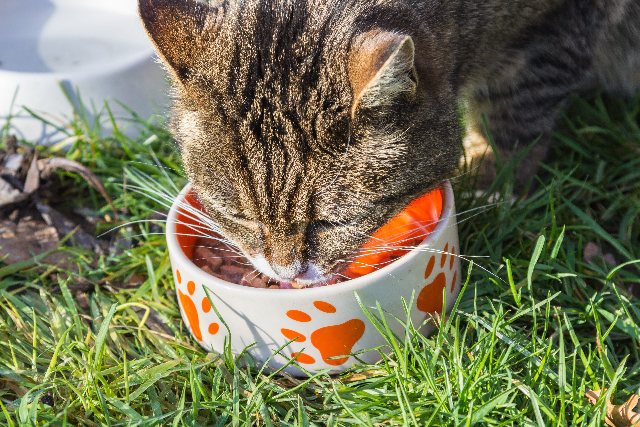Unveiling the Mysterious Bond: Can Cats Eat Peanuts? Prepare to Be Astonished by the Unexpected Answer!

Introduction
Welcome to this intriguing exploration of feline dietary preferences! In this article, we will dive into the topic of whether cats can eat peanuts. Cats are known for their discerning taste buds and unique dietary requirements, so it’s essential to understand what foods are safe and suitable for their consumption. So, can cats enjoy the crunchy goodness of peanuts? Let’s unravel the surprising truth!
The Curiosity of Cats
Cats possess an innate curiosity, always eager to investigate new scents, tastes, and textures. Their inquisitive nature may lead them to show interest in the foods we humans enjoy, including peanuts. It’s only natural to wonder if sharing this snack with our furry companions is harmless or potentially dangerous.
Understanding a Cat’s Diet
Before delving into the peanut debate, it’s crucial to understand a cat’s dietary needs. Cats are obligate carnivores, which means their bodies have evolved to thrive on a meat-based diet. They require essential amino acids, such as taurine, which are found abundantly in animal proteins. As such, the primary source of nutrition for cats should be high-quality commercial cat food.
The Allure of Peanuts
Peanuts, with their crunchy texture and nutty flavor, often captivate our taste buds. However, it’s important to remember that cats have unique nutritional requirements. While peanuts do contain protein and healthy fats, they are not an ideal choice for feline consumption.
Can Cats Eat Peanuts?

While it may seem tempting to share your love for peanuts with your feline companion, it’s crucial to exercise caution. The truth is, cats can eat peanuts, but it is generally not recommended. Peanuts are not toxic to cats, but they can pose several risks to their health.
The Nutritional Profile of Peanuts
Peanuts are packed with protein, healthy fats, and various vitamins and minerals, making them a nutritious snack for humans. However, cats have different dietary needs and lack certain enzymes to digest peanuts effectively. Cats are obligate carnivores, meaning their bodies are adapted to consuming primarily meat-based diets. They require specific nutrients, such as taurine, which are found abundantly in animal tissues.
Potential Risks of Feeding Peanuts to Cats
Feeding peanuts to your cat can potentially lead to adverse effects. Here are some of the risks associated with cats consuming peanuts:
- Choking Hazard: Peanuts are small and round, posing a choking hazard to cats, especially if they attempt to swallow them whole.
- Digestive Upset: Cats may experience digestive issues like vomiting, diarrhea, or stomach discomfort when they consume peanuts. The high-fat content and fiber in peanuts can be challenging for their digestive system to handle.
- Allergic Reactions: Just like humans, cats can develop allergies to certain foods, including peanuts. Allergic reactions in cats can manifest as skin rashes, itching, swelling, or even respiratory distress. It’s important to monitor your cat closely for any signs of allergic reactions if they accidentally ingest peanuts.
The Surprising Reactions
In some cases, cats may develop an allergic reaction to peanuts. Just like humans, cats can experience allergies to certain foods. While peanut allergies are more common in dogs, cats can also be susceptible. It’s crucial to be aware of the signs and symptoms of an allergic reaction in felines.
Symptoms of Peanut Allergy in Cats
If a cat is allergic to peanuts, it may exhibit various symptoms, including:
- Skin irritations, such as itching, redness, or rashes.
- Gastrointestinal issues, such as vomiting or diarrhea.
- Respiratory difficulties, such as coughing, wheezing, or sneezing.
- Swelling, particularly around the face, throat, or paws.
- Lethargy or a general sense of discomfort.
How to Safely Introduce Peanuts
While peanuts should generally be avoided in a cat’s diet, if you’re determined to share this snack with your feline companion, it’s essential to proceed with caution. Start by offering a tiny, finely crushed amount of unsalted peanut butter and observe your cat’s reaction closely. If there are no adverse effects, you can gradually increase the quantity. However, always consult with your veterinarian before introducing any new food into your cat’s diet.
Exploring Safer Alternatives
While peanuts may not be the ideal snack for your feline friend, there are several other safe and healthy treats you can offer them. Consider these alternatives that are both enjoyable and beneficial for your cat’s well-being:
1. Lean Meat Treats
Cats are carnivores, and lean meats like chicken, turkey, or fish make excellent options for occasional treats. Ensure that the meat is thoroughly cooked and free from seasoning or additives that may harm your cat.
2. Catnip or Cat Grass
Most cats are enticed by the allure of catnip or cat grass. These natural plants provide sensory stimulation and are safe for cats to consume in moderate amounts. Offering them catnip-infused toys or growing cat grass indoors can be a delightful treat for your feline companion.
3. Commercially Available Cat Treats
Pet stores offer a wide array of cat treats specifically formulated to meet feline nutritional requirements. These treats are often designed to cater to cats’ taste preferences while ensuring they receive the necessary nutrients. Always opt for high-quality treats from reputable brands.
The Role of Protein in a Cat’s Diet
Protein plays a vital role in a cat’s overall health and well-being. As obligate carnivores, cats require protein to maintain strong muscles, healthy skin, and a robust immune system. It’s crucial to prioritize the protein content in their diet and ensure it comes from appropriate sources.
FAQs (Frequently Asked Questions)
Can cats have peanut butter?
While some cats may enjoy the taste of peanut butter, it should be given in moderation. Make sure the peanut butter is unsalted and free from xylitol, a sweetener toxic to cats.
What should I do if my cat accidentally eats peanuts?
If your cat consumes peanuts accidentally, monitor their behavior closely. If any abnormal symptoms or distress occur, contact your veterinarian immediately.
Are there any nuts that are safe for cats?
While cats can safely consume certain nuts in small quantities, it’s best to avoid nuts altogether. Stick to treats specifically made for cats to ensure their nutritional needs are met.
Can cats develop peanut allergies over time?
Cats can develop allergies to peanuts or other foods at any point in their lives. If you notice any adverse reactions after introducing a new food, consult your veterinarian.
What are some protein-rich foods suitable for cats?
Protein-rich foods suitable for cats include chicken, turkey, fish, and beef. Always ensure these foods are cooked and free from seasonings or additives that may be harmful to cats.
Is it safe to give peanuts to kittens?
Kittens have delicate digestive systems, and it is best to wait until they are older and have a more mature digestive system before introducing peanuts or any new food.
Can cats benefit from a vegetarian or vegan diet that includes peanuts?
Cats have specific nutritional requirements that are best met through a diet that includes animal proteins. Vegetarian or vegan diets are generally not recommended for cats.
Can peanuts be toxic to cats?
No, peanuts are not toxic to cats. However, they can cause digestive upset and pose a choking hazard.
Are there any health benefits to feeding peanuts to cats?
Cats have specific dietary requirements that are best met through a balanced, meat-based diet. Peanuts do not provide essential nutrients like taurine, which are vital for a cat’s well-being.
Conclusion
In conclusion, while cats can technically eat peanuts, it is not advisable to include them in their diet. The potential risks of choking, digestive upset, and allergic reactions outweigh any potential benefits. As responsible cat owners, it’s essential to prioritize our feline companions’ health and offer them nutritionally appropriate and safe treats. Opt for alternatives that cater to their carnivorous nature and consult with your veterinarian for personalized advice. Remember, a healthy and happy cat is a well-nourished cat!
Thank you for visiting Loving Pet Parents! We’re passionate about providing helpful information and resources to pet owners. If you’ve enjoyed reading our articles, we invite you to explore more of our content on our website. You’ll find a wealth of information on pet care, behavior, nutrition, and much more. Plus, we’re always adding new articles and resources to help you give your furry friend the best possible care. So why not bookmark our website and check back regularly for new content? We appreciate your support and look forward to sharing more valuable insights with you!
All About the Legendary Bengal Cat
Top 10 Low-Maintenance Tropical Fish That Are Easy to Care For
10 Effective Ways to Help Cats Bond With Babies | Expert Guide
Mastering Obedience Training: A Comprehensive Guide for Pet Owners
Discover the Cure for Swim Bladder Disease:Floating with Confidence
Ultimate Guide: How to Take Care of Goldfish | Expert Tips
Why Do Dogs Howl?: Unlocking the Mystery Behind Their Melodic Calls
Complete Betta Fish Care Guide For Beginners: Everything You Need
Betta Fish Fin Rot: Symptoms, Causes, Prevention & Treatment
Discover Why Do Cats Rub Against You?
5 Effective Strategies to Prevent Cats From Pooping Outside the Litter Box
Cat Bathing Mastery: Unlock the Secrets to a Scratch-Free Experience!
Why Do Cats Stare at Me? Unveiling the Hidden Secrets Behind Their Mesmerizing Gazes
200+ Funny and Clever Fish Names: Hilarious Ideas for Naming Your Aquatic Friends
Dog Training 101: How to Completely Train Your Dog
Common Cat Health Problems: How to Keep Your Cat Healthy
Are Calico Cats Always Female? The Surprising Truth Revealed
We hope you’ve found our articles informative and helpful in caring for your furry companion. If you think our content could benefit other pet owners, we would greatly appreciate it if you shared it with your friends and family. By sharing our articles, you’ll be helping to spread valuable information that can improve the lives of pets and their owners. You can share our articles on social media, through email, or by simply telling others about our website. We thank you for your support and for helping us reach even more pet lovers with our content.





